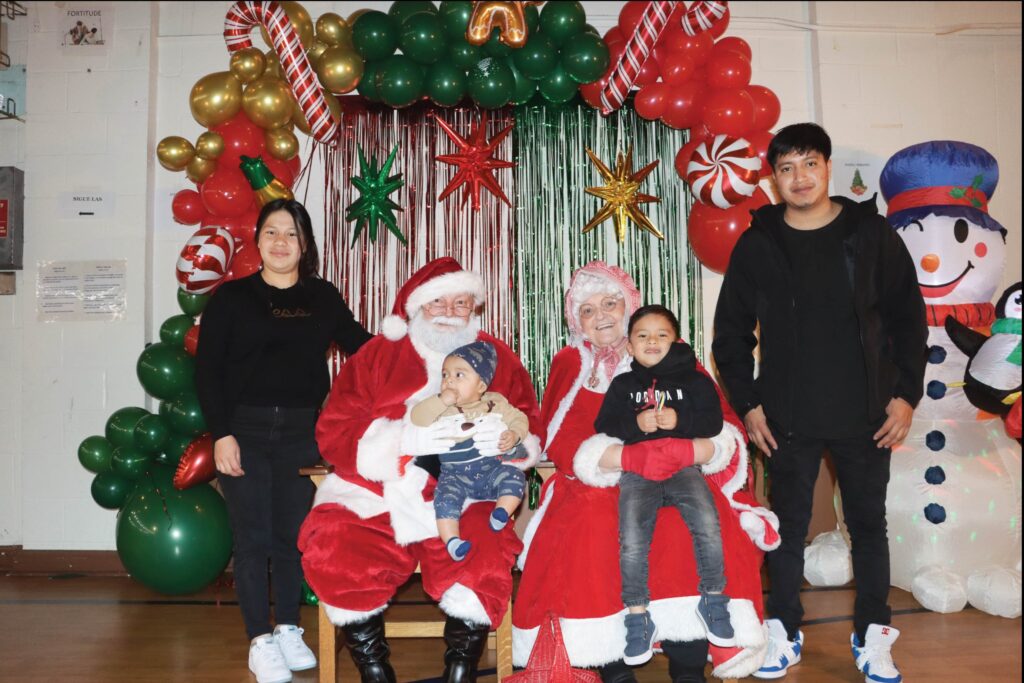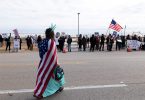
by Andrea Acosta, OSV News
SILVER SPRING, Md. (OSV News) — They crossed the border in fear, arrived with nothing and still have little. They are the immigrants who have just arrived by bus to the Washington area, often cold and in need, like Jesus, Mary and Joseph looking for shelter in Bethlehem.
Catholic Charities of the Archdiocese of Washington hosted a Christmas party for 250 of them Dec. 6 at the agency’s center in Silver Spring, a Washington suburb.
“It will be our first Christmas in the United States. Although we are in need, we are happy because we are together as a family,” said Talia Castro, who crossed the border alone last March and is five months pregnant. Two months later her husband, Ricardo Gonzalez, arrived, and later their oldest son, Jeiner, came with his grandmother.
Ricardo started working in construction locally, but as usual in this winter season, he became unemployed. Talia cares for their 5-month-old baby, Daniel, while they live in a room in Gaithersburg, Maryland.
They wandered around several cities in their native Colombia looking for opportunities. For seven years, they tried their luck in Ecuador, but it didn’t work out. So they moved north to turn themselves in to the American border authorities.
This annual Catholic Charities Christmas party for the migrant families was a joyous one.
In an atmosphere full of balloons, candies, color, music and gifts, everyone wanted to take pictures with Santa Claus and Mrs. Claus. There was a traditional Nativity scene, too.
Children received toys, and adults received bags of food (canned goods, cereals, soups and pasta). Coats, hats and gloves were distributed.
“The Americans are very generous, they have helped us a lot and we feel very welcome,” said Guatemalan mother Roselia Romero holding her baby, Andrew, born six months ago. At her side was her husband, Hugo, and the couple’s other son, Adel.
This family arrived in the United States with very little, other than the clothes on their backs. He arrived in 2020, she in 2023 with Adel. They say they had a scare in Mexico because delinquents wanted to rob them.
Hugo also works in construction and generates enough to pay rent for a room in Laurel, Maryland. That’s where the four of them live while they are adapting to a new land.
They have an immigration court date in February. They will appear before the authorities for the fourth time, but they know they do not qualify for asylum.
Guatemala’s economic situation prompted them to emigrate. “There is no work in our country,” said Hugo, who comes from a Catholic family of eight children, and Roselia, who has nine siblings.
The Romeros’ American dream is to establish a construction business and buy or build their own house.
Wiliandri Rivas and her family fled Venezuela six years ago to seek opportunities in Colombia. When that didn’t work out, they decided to wait two months in Mexico to get an appointment with the authorities and then enter the U.S. legally in May — she and her husband, Maikel, and their two girls.
Catholic Charities helped them get funds to pay two months’ rent.
They have a work permit, which makes the process easier for them. They reside in Hyattsville, Maryland, but are behind on their rent. Maikel works as a barber, but they have a limited income, so the coats the four received at the Catholic Charities party they really need for this first winter.
“This will be our first Christmas in the United States and we feel safe and happy in a country where we can find many opportunities and get ahead,” the young Catholic mother told El Pregonero, the Spanish-language news outlet of the Archdiocese of Washington.
During the party, about 10 students from Connelly School of the Holy Child in Potomac, Maryland, served as volunteers, providing entertainment, handing out food and gifts.
“I’m here because it’s Christmas and this is God’s work. I like being with the kids and serving. I like seeing people’s faces when they realize that others love them,” Mariana Telles, a ninth grader at Connelly, told El Pregonero.
The Colombian girl, who receives a scholarship at her school, said she identified with the immigrant families she was assisting. Her parents arrived in the United States in 2005, and little by little they got ahead.
Mariana also volunteers at the food bank of her parish, St. Jude in Rockville, Maryland, and at Interfaith Works, an organization that provides pre-owned clothing to the needy.
Buses with immigrants who crossed the U.S.-Mexico border without authorization began arriving in the Washington area in April 2022. About 30 families still arrive on each bus, but less frequently.
Texas and other border governments offer them the trip at no cost and it is voluntary. At first they arrived at Union Station in the early morning. Later the drivers began to leave them adrift on any street in the capital, and the luckiest ones arrived at the SAMU reception center in Rockville.
Some get help to continue their journey to other sanctuary cities such as New York or Chicago where they want to settle because they have family or friends or job opportunities. Others are taken in by friends or relatives locally, and the rest stay for up to a month at SAMU. This group is the most vulnerable, starting from scratch, with no one and nothing.
Catholic Charities, along with other charitable organizations, have assisted them from the very beginning at SAMU with their basic needs: housing, medical care, food, cash, work, legal advice, job training and English classes. They currently take on approximately five new families each week to serve them and connect them with services in the local counties.
For example, the newcomers receive help applying for assistance from Montgomery County to pay rent for a month or two. In addition, the charitable groups provide clothing, food, gift cards for food and help with children’s school enrollment. Pregnant women or single mothers can receive permanent housing.
Experts say that it takes about five years for an immigrant to learn English, get to know the U.S. system, make his or her way, stand on his/her own two feet, excel and run after the American dream.






